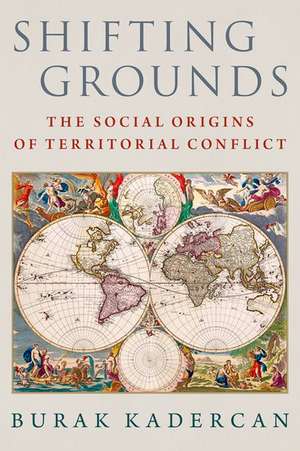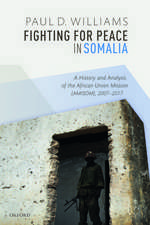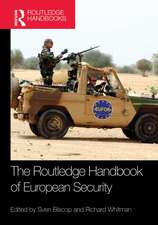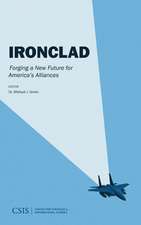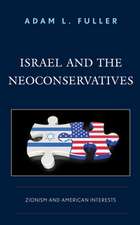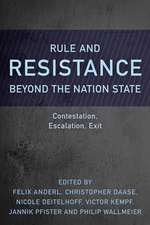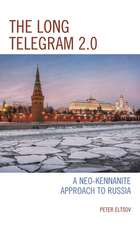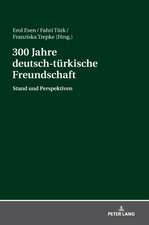Shifting Grounds: The Social Origins of Territorial Conflict
Autor Burak Kadercanen Limba Engleză Hardback – 10 oct 2023
Preț: 345.68 lei
Preț vechi: 471.20 lei
-27% Nou
Puncte Express: 519
Preț estimativ în valută:
66.14€ • 69.31$ • 54.68£
66.14€ • 69.31$ • 54.68£
Carte disponibilă
Livrare economică 11-17 martie
Preluare comenzi: 021 569.72.76
Specificații
ISBN-13: 9780197686690
ISBN-10: 0197686699
Pagini: 320
Dimensiuni: 229 x 279 x 19 mm
Greutate: 0.77 kg
Editura: Oxford University Press
Colecția OUP USA
Locul publicării:New York, United States
ISBN-10: 0197686699
Pagini: 320
Dimensiuni: 229 x 279 x 19 mm
Greutate: 0.77 kg
Editura: Oxford University Press
Colecția OUP USA
Locul publicării:New York, United States
Recenzii
In the immediate aftermath of what was the most consequential feature of the later twentieth century, the Cold War, there was much debate in different groups within academia about whether the future portended a world in which globalization might roll over the world political map to produce a world without significant territorial divisions or one in which regional spheres of power and influence would produce a more amorphous territoriality which might in turn reproduce many of the features of the Cold War. In this pathbreaking book, a synthetic account brings together both analysis of territorial ideas and actual empirical history, Burak Kadercan provides some basic tools for rethinking how the social sciences in general, and international relations in particular, should approach understanding of the vital role of territoriality in human history.
Shifting Ground marks a decisive development in constructivist IR. Kadercan returns constructivism to the core of the discipline, to state-territory relations and the question of war. In opening up the variable construction of state-territory relations for inquiry, he deprives materialist accounts of their last bastion, the sovereign and territorial state. At the same time, he develops an approach to territoriality able to account for, rather than deny, historical variation in state-territory relations. More than this, unlike any other systemic account of IR, he is able to incorporate nation states and empires, as well as the global North and South, in his theory of territoriality and war. Kadercan has indeed shifted the ground with this excellent book.
Shifting Grounds is a compelling dialogue of IR and political geography on territories as plural ideals and practices. With conceptual creativity and rich case studies, it brings thinking about states, territories, and war to a new level.
For much of human history territorial claims have been at the heart of armed conflicts. However, precisely because territory was so integral to most violent conflicts it was often taken for granted and has not been properly theorized. In this excellent and innovative book Kadercan offers a first systematic and multidisciplinary analysis of the complex and historically changing relationships between 'territorial ideas' and armed conflict.
This theoretically and conceptually rich study provides a crucial addition to our understanding of territory, conflict, and ideas in international politics. Through wide-ranging historical and contemporary case studies, the book demonstrates the mutual implications of territorial orders and warfare. Essential reading for anyone interested in the central role of territory in international relations.
Shifting Ground marks a decisive development in constructivist IR. Kadercan returns constructivism to the core of the discipline, to state-territory relations and the question of war. In opening up the variable construction of state-territory relations for inquiry, he deprives materialist accounts of their last bastion, the sovereign and territorial state. At the same time, he develops an approach to territoriality able to account for, rather than deny, historical variation in state-territory relations. More than this, unlike any other systemic account of IR, he is able to incorporate nation states and empires, as well as the global North and South, in his theory of territoriality and war. Kadercan has indeed shifted the ground with this excellent book.
Shifting Grounds is a compelling dialogue of IR and political geography on territories as plural ideals and practices. With conceptual creativity and rich case studies, it brings thinking about states, territories, and war to a new level.
For much of human history territorial claims have been at the heart of armed conflicts. However, precisely because territory was so integral to most violent conflicts it was often taken for granted and has not been properly theorized. In this excellent and innovative book Kadercan offers a first systematic and multidisciplinary analysis of the complex and historically changing relationships between 'territorial ideas' and armed conflict.
This theoretically and conceptually rich study provides a crucial addition to our understanding of territory, conflict, and ideas in international politics. Through wide-ranging historical and contemporary case studies, the book demonstrates the mutual implications of territorial orders and warfare. Essential reading for anyone interested in the central role of territory in international relations.
Notă biografică
Burak Kadercan is an Associate Professor of Strategy and Policy at the United States Naval War College in Newport, Rhode Island, and a Senior Associate at the Center on Irregular Warfare and Armed Groups (CIWAG). Kadercan's research agenda lies at the intersection of International Relations Theory, strategic and security studies, political geography, and international history. His research has been published in outlets such as International Security; International Theory; Review of International Studies; International Studies Review; Territory, Politics, Governance; Middle East Policy; Cambridge Review of International Affairs; and Global Studies Quarterly. He is also the co-editor of Territorial Designs and International Politics: Inside-out and Outside-in (2018).
